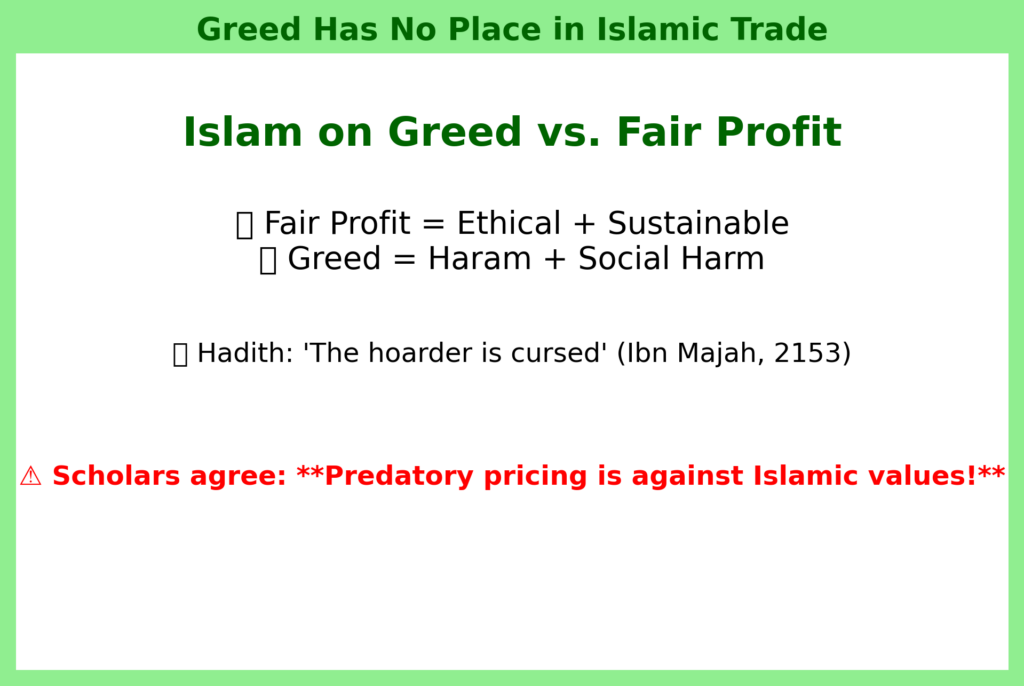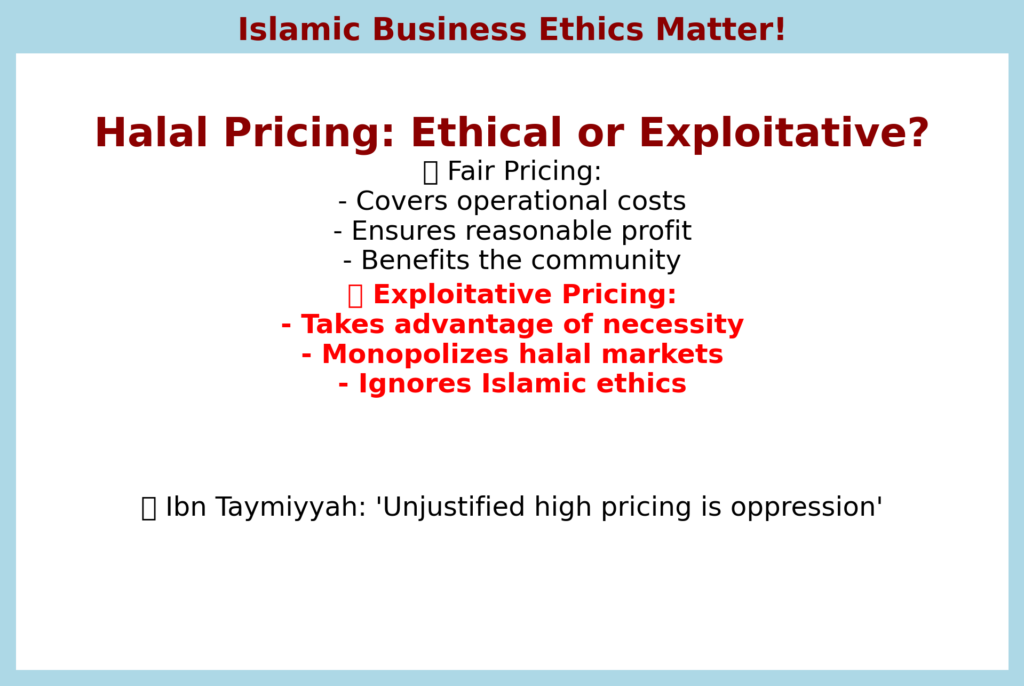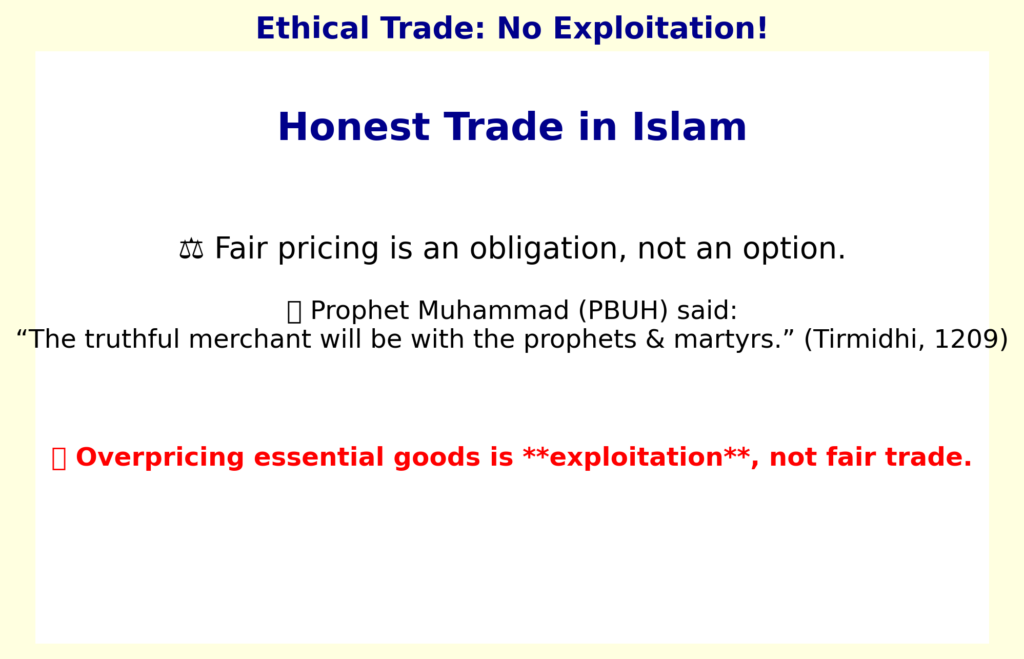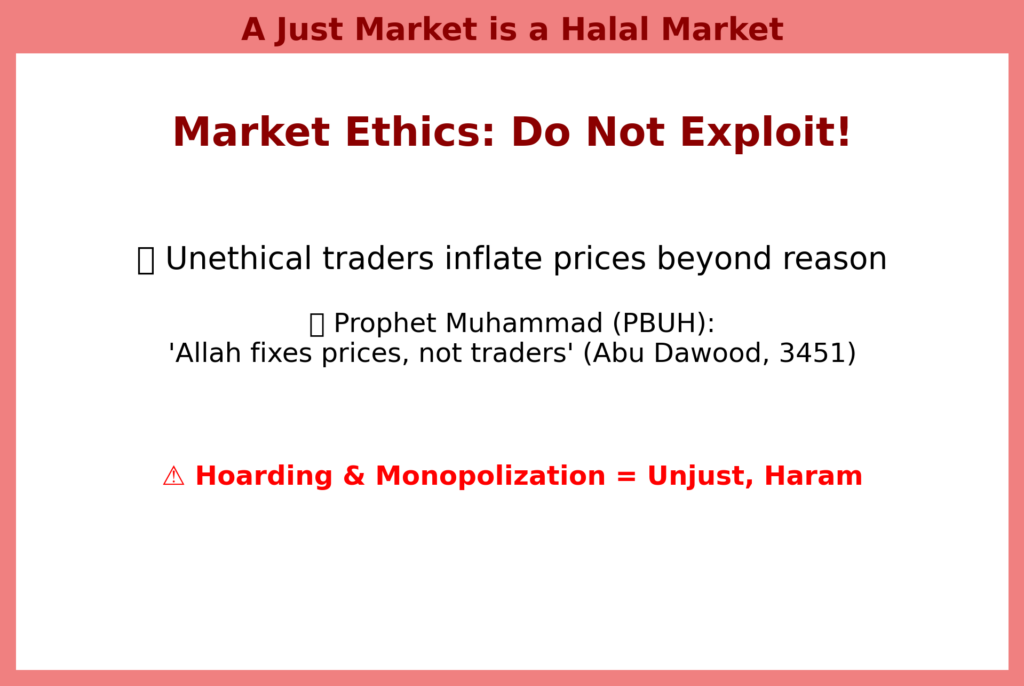Abstract
This research examines the ethical and economic implications of overpricing halal products in Muslim-owned grocery stores, particularly in the UK. Using the framework of Islamic jurisprudence, Quranic injunctions, Hadith literature, and scholarly opinions, this study explores whether overpricing halal products aligns with Islamic ethical and business principles. The research also examines market dynamics, economic factors, and the moral responsibilities of Muslim business owners.

1. Introduction
- Background of the study: Overpricing in Muslim-owned stores, particularly for halal products.
- The significance of the issue: Impact on Muslim consumers, economic consequences, and religious concerns.
- Objectives of the study:
- To analyze whether overpricing halal products aligns with Islamic business ethics.
- To explore Quranic and Hadith injunctions on fair trade and profit-making.
- To investigate opinions of classical and contemporary Islamic scholars.
- To examine economic factors contributing to price variations.
- Research methodology: Use of Quran, Hadith, Islamic Fiqh, and economic analysis.

2. Business Ethics in Islam
2.1. Islamic Principles of Trade and Business
- Islam encourages trade but mandates fairness and honesty.
- Surah Al-Mutaffifin (83:1-3) – Condemnation of those who cheat in trade.
- Surah Al-Baqarah (2:188) – Prohibition of unjust earnings and deceitful transactions.
- Hadith: “The truthful and honest merchant will be with the Prophets, the truthful, and the martyrs.” (Tirmidhi, 1209).
2.2. The Concept of “Riba” (Usury) and “Gharar” (Deception)
- Charging excessive profit is not the same as “riba,” but if it leads to exploitation, it becomes unethical.
- Prophet Muhammad (PBUH) prohibited deception in transactions (Sahih Muslim, 102).
- The Hadith of “Talaqqi al-Rukban” (intercepting traders before they reach the market) – traders must not take undue advantage of consumers (Bukhari, 2150).

3. The Pricing of Halal Products and Market Ethics
3.1. Fair Pricing in Islam
- “Do not hoard, for hoarding is wrong.” (Hadith, Muslim 1605).
- Ibn Taymiyyah’s view: Prices should be set by market forces unless there is exploitation.
- Al-Ghazali’s view: Business must ensure reasonable profit, but not at the expense of consumer welfare.
3.2. The Prophet’s Stance on Price Control
- The Prophet (PBUH) refused to fix prices when asked, stating: “Allah is the One Who fixes prices.” (Abu Dawood, 3451).
- However, scholars argue price-fixing is allowed in cases of public interest.
3.3. When Profit Becomes Haram
- If a merchant deliberately raises prices knowing customers have no alternative, it falls under exploitation (Surah An-Nisa, 4:29).
- Abu Hanifa’s ruling: A 100% profit margin is only justifiable in luxury items, not essentials like food.

4. Economic Analysis: Why Are Halal Products More Expensive?
4.1. Supply Chain and Certification Costs
- Halal certification costs and slaughter process costs.
- Limited suppliers of halal meat compared to non-halal.
4.2. Market Monopolies and Lack of Competition
- Muslim stores often monopolize halal markets, allowing price hikes.
4.3. Demand and Supply in Pricing
- Higher demand for halal meat within Muslim communities.
- Limited halal supply in mainstream supermarkets.
4.4. Case Study: Price Comparison
| Product | Farmfoods (Non-Muslim Store) Price | Muslim-Owned Store Price | Price Difference |
| Halal Chicken | £2/kg | £4-5/kg | 100-150% higher |
| Halal Lamb | £6-7/kg | £12-14/kg | 100% higher |
| Halal Beef | £5/kg | £8-12/kg | 60-120% higher |
| 10kg Laila Rice | £13 | £22 | 69% higher |
5. The Ethical Dilemma: Are Muslim Business Owners Justified?
5.1. Justifiable Reasons for Higher Prices
- Costs of halal certification.
- Costs of sourcing from halal-approved suppliers.
5.2. Unjustifiable Reasons (Ethical Violations)
- Exploitation of religious necessity.
- Hoarding and price manipulation.
5.3. The Role of Greed
- Hadith: “The one who hoards food in order to increase its price is a sinner.” (Ibn Majah, 2153).
- Islamic ethics prioritize community welfare over profit maximization.
6. Scholarly Opinions on Overpricing in Essential Goods
- Ibn Qayyim Al-Jawziyyah: If traders exploit community needs, the government should intervene.
- Sheikh Yusuf Al-Qaradawi: Islamic ethics demand traders maintain affordability.
- Mufti Taqi Usmani: A fair markup is permitted, but predatory pricing is haram.
7. Solutions and Recommendations
7.1. The Role of the Business Community
- Adoption of ethical pricing models.
- Promoting competition among halal suppliers.
7.2. The Role of Islamic Scholars
- Issuing fatwas against exploitation in trade.
7.3. Consumer Awareness
- Encouraging Muslim consumers to explore alternative sources.
7.4. Government and Community Interventions
- Potential government subsidies for halal-certified products.
- Establishing halal cooperatives for fair pricing.
8. Conclusion
- Summary of ethical concerns in overpricing halal products.
- The need for balance between profit and ethical responsibility.
- Encouragement for businesses to uphold Islamic principles.
References
- The Holy Quran, various verses.
- Sahih Al-Bukhari and Sahih Muslim, various hadith.
- Al-Ghazali, Ihya Ulum al-Din – Business ethics in Islam.
- Ibn Taymiyyah, Majmu’ al-Fatawa – Price regulation in Islamic jurisprudence.
- Taqi Usmani, An Introduction to Islamic Finance – Profit-making ethics.
- Yusuf Al-Qaradawi, Fiqh Al-Zakah – Islamic economic principles. (A Study Conducted by ILA Research)